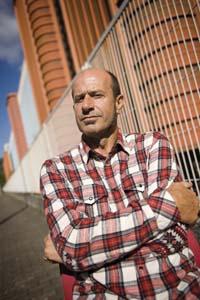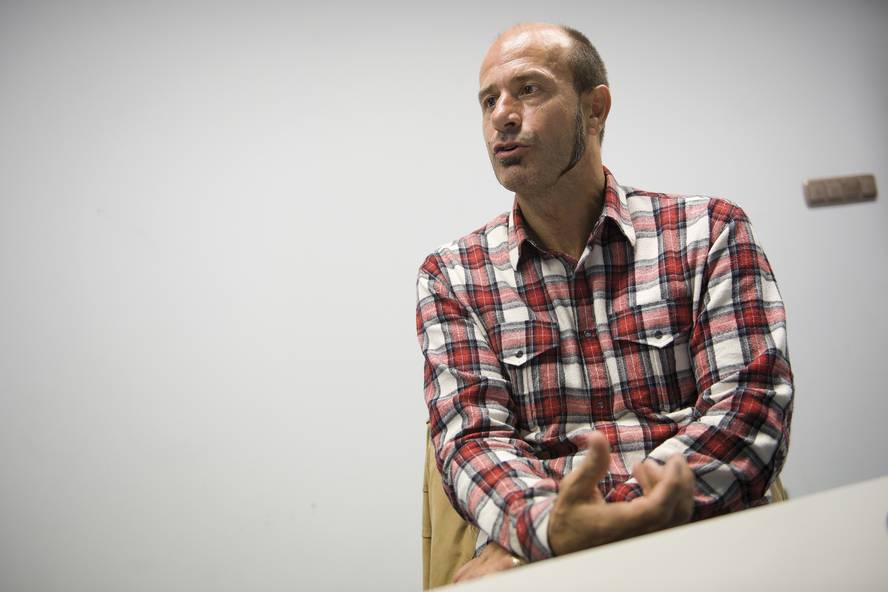"With antiretrovirals I have only had benefits, but I have also put a lot on my part"
I did the test in 1986. I am homosexual, I have had a homosexual life affectively and at that time there was a terror in the collective. Very hard things were happening around us. He lived in New York, did safe sex as prevention, and it is true that we did the “ostrich” of the test: we lived scared, every day we knew that a friend or acquaintance was very sick, died... For other reasons my partner did the test and received the refusal. And somehow, that situation led me to get to the beef and do the test: I thought that 75% of the cases were going to be denied, and that 25% might be affirmative. I found the yes.
No, I went to the test in complete health. Then, taking the bills out, I realized I had a virus when I went to the United States in 1985. When it was still thought that such an influence was not perceived in Europe, seeing the problem as something distant, and when we had not yet internalized preventive measures, I had already had contact with the virus. In that context I knew I was a carrier.
I immediately got into the hands of a specialist doctor. I am very aware of the time to go to the visits: the waiting room was huge, they lived real dramas. People were sad, very sick. Although I was fine, I was clear that I had to start controlling the virus, and every three months I did analysis and analysis. I was five years like that. In the United States that attention was very expensive, there is no social security, all attentions are private. In 1992 I decided to return to Euskal Herria, when I saw that somehow I had a few years left.
I realized that I had to prepare myself: put myself in the hands of a good public health system and speak, spread and understand the situation among my loved ones. I spent another five years in good health under Osakidetza's control, until in 1997 we lost our defenses. Then they told me I had to enter. Asking for permission, I also made a farewell trip with my friends and returned to the hospital convinced that I was not going to leave anymore or that I was going to make a few inbound and outbound. Then I suffered several diseases, even those that had nothing to do with HIV... I had a crisis or syndrome and then developed AIDS, I went from HIV to AIDS.
In the hospital the doctor came to me saying that there were new medications. I was going to explain what they were, but then I cared so much because I was full of pain. I remember, however, that I had an occurrence --like me, many more also -: "Show us all who are to prove, if it does us good, and if not, learn with us, for the next." So it was. I started with antiretrovirals; the first drugs were hard and at first I did not support them, I threw them. But maybe not because of medicine, but because my picture was very bad. It was one or two months and then I made myself to them. From then until today, only benefits. Unlike most, I have not had any side effects.
Without the medicine cabinet we could not live, but it is not enough; to really feel benefited we need the help of other things. Having HIV and being affected by AIDS, apart from the disease, is something that suffers a great stigma. And there come associations in some way to see what they can do for the sick. To overcome the crisis that this implies, psychological help is needed and changes must be made in life, taking care of them. I have only had benefits with antiretrovirals, but for my part I have also done a lot: I believed that taking medicines would do me a lot of good and I have given great importance to taking them well. Since I had a second chance to live, I was clear that I would live differently and I have always had a positive attitude, which would also influence my direction.

It has changed a lot. The first time I was hospitalized, I remember having to make a sketch. In addition to antiretrovirals, he had other treatments and had so much to take... My only function was to take medicine, eat and breathe. But keep in mind that more than twenty antiretroviral pills were taken in two or three doses – one in the morning, one in the afternoon, or at noon; one with and without food, another...-. It was very difficult to do everything right, and I thought he was a junqui, if he had no house, or lived in a broken family... Now it is much easier.
While better medications are performed, the amount has been reduced. We went from being three drug families to being more numerous and easy to understand, as the pharmaceutical industry discovered a huge beech. New medicines have been created, there are elderly people who persist, but they have also been changing, especially when adverse effects have been detected -- we do not know why the same drug has so different effects, but the one that goes very well to one can lead others to a depressive situation, for example. I, now, take the medication once a day: only four pills in one shot. Of course, that's much easier. Now, at home, taking what you have to take before bedtime and doing it in secret or in privacy is very easy. In this sense, the quality of life has also improved a lot.
I would say we have always had fairly equal benefits. Perhaps a few months apart, but not because there are no drugs here - even when they did not exist, they were obtained - but perhaps because the U.S. health system has authorized a drug before Europe. In the United States there are many things that can be achieved with money, maybe we did not have some things because they could not be bought with the money, but then we have arrived a short time and we have not had to pay. In that sense, we are all on the same level. There, whoever has money receives better care and who does not, neither better nor worse. That's a drama, of course.
Considering where and when we were born, we have an enormous luck, since in the world of AIDS we have had references from the beginning. In the CAPV we have pioneered facial arrangements in exchange for syringes for the imbalances caused by lipoatrophy, in doing all those that should be done to include them in the internal protocols of our health system, in including them in the protocols of artificial insemination so that HIV can have children without risk... Still many of our benefits are not those of state HIV. The relationship we have maintained, partnerships, institutions and AIDS in particular has always been optimal. You could do better and you can do better, and in that we are.






